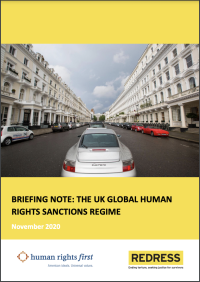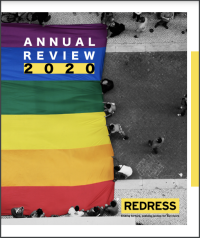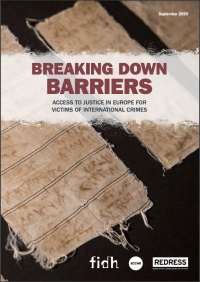Publications
REDRESS’ publications are also available in hard copy format. Please contact us for further information on [email protected].
This briefing note summarises the main elements of the UK global human rights (‘GHR’) sanctions regime, which was introduced on 6 July 2020, and authorises the imposition of financial and immigration sanctions on individuals in order to deter and provide accountability for involvement in certain serious human rights violations.
In a joint letter to the Sudanese transitional government, over 20 civil society organisations urged the government to promptly ratify the UN Convention against Torture and Other Cruel, Inhuman or Degrading Treatment or Punishment (UNCAT) and the International Convention for the Protection of All Persons from Enforced Disappearances (ICPPED).
Our Annual Review 2020 sets out what REDRESS achieved from 1 April 2019 to 31 March 2020. Our work was truly international, spanning five continents and over 40 countries. Amongst our many successes, we secured a landmark judgment at the Inter-American Court of Human Rights, which will help to protect LGBT+ persons in Latin America and beyond from discriminatory torture. We helped to build a new network of torture survivors of the conflict in Uganda, which advocated for the introduction of a new transitional justice law that will finally allow survivors to access effective reparations. We held the UK government to account for failing to support a British citizen detained in Panama, and persuaded the Foreign, Commonwealth and Development Office to introduce changes in how they operate.
REDRESS and over 20 other Afghan, Australian and international human rights organisations wrote to the Assistant Inspector-General of the Australian Defence Force, Major General Justice Paul Brereton, urging him to commit to releasing the report of the Inquiry into allegations of breaches of international humanitarian law (IHL) by Australian special forces in Afghanistan.
This Report examines the extent to which the specialised units within the EU that investigate and prosecute serious international crimes uphold EU standards on victims’ rights. It is based on research conducted between 2019 and 2020, including approximately 140 interviews with practitioners and policy makers in five Member States—Belgium, France, Germany, the Netherlands and Sweden. The Report includes five country chapters that examine the law and practice in these countries as well as an analysis of common challenges and emerging best practices. It provides a roadmap for improving victims’ access to information, protection and support.
This briefing was prepared by Protection Approaches, Waging Peace and REDRESS ahead of a debate on a Westminster Hall debate on October 15th on the June massacres in Sudan and the UK’s support for Sudan’s democratic transition. Our briefing highlights how at a critical moment in Sudan's transition towards democracy, the risk of violence and atrocities remain high. This presents an important opportunity for the UK to reprise its role as Sudan's "critical friend” to support an inclusive and sustainable transition process for Sudan.
In this letter, REDRESS and 9 other civil society organisations welcome a number of improvements made in the March 2020 version of the Draft Convention on International Cooperation in the Investigation and Prosecution of the Crime of Genocide, Crimes against Humanity and War Crimes (MLA Draft Convention).



